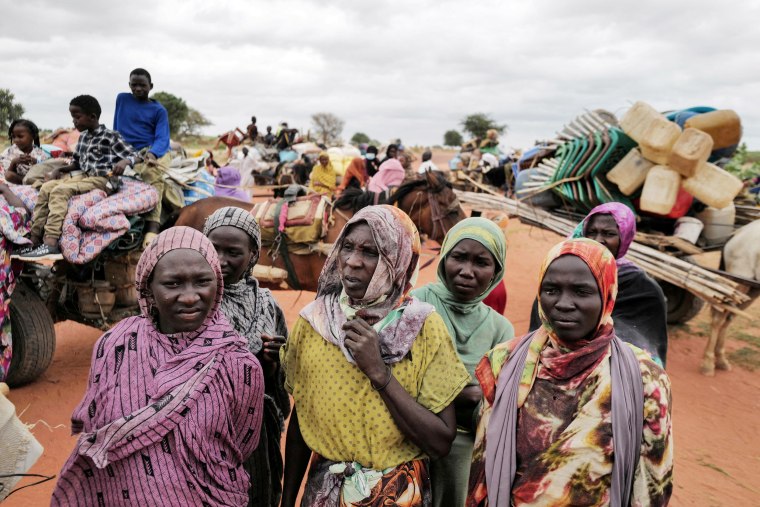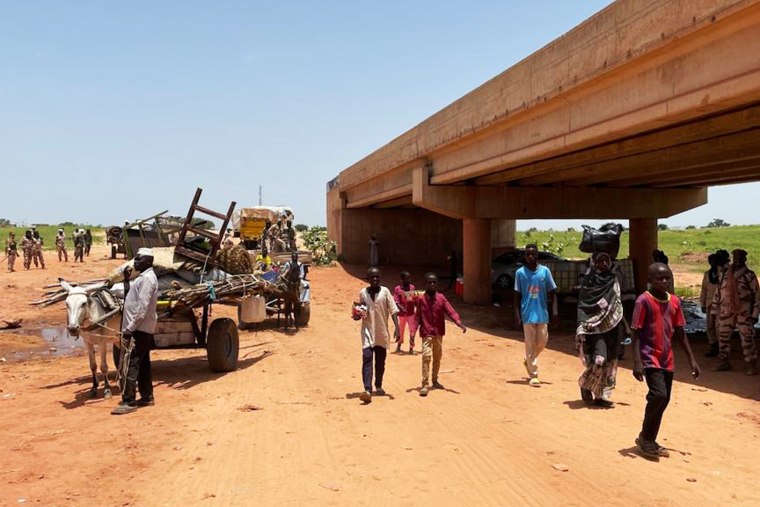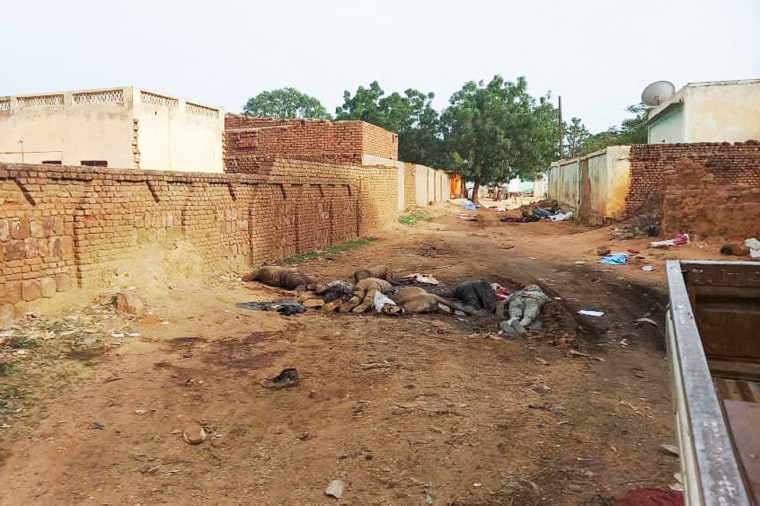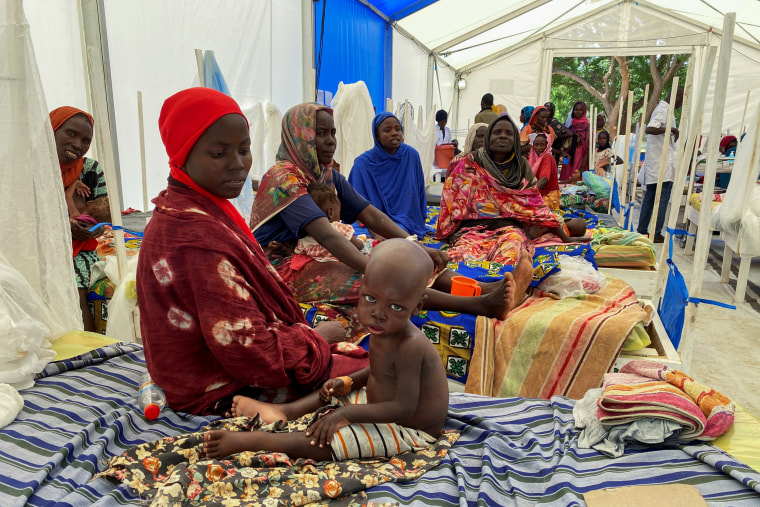NOTE: This article contains a graphic photo that could be offensive or disturbing to some readers.
ADRÉ, Chad — Barely five months ago, this parched patch of land sat largely empty, next to the nearby town of Adré, home to a few thousand people. Today, it takes almost a half-hour by car to cross the packed settlement, where more than 200,000 civilians who fled the civil war in neighboring Sudan have taken refuge.
Most of the refugees living in the sea of makeshift tents built from bent branches and tarps are women and children from Sudan’s El Geneina and surrounding villages. Many tell of Arab attackers preying on non-Arab Masalit people, and of escaping under a rain of bullets, of being targeted because of their ethnicity.
Hassnat Ibrahim Yacoub and her three sisters fled El Geneina, the capital of the West Darfur region and the site of what some say are war crimes.
She pointed with pride to her family as they sat around her on a rug in the shade of a large tree, saying she was glad they had stuck together. Sorrow hangs over them — the women’s brother had stayed behind in El Geneina and was killed, and their homes in the city have been “destroyed,” said Yacoub, who like the majority in the settlement is of the Masalit ethnicity.
“We don’t have anything now,” she said, adding that their new life in the camp was “very difficult” with food and water hard to come by.

The United Nations estimates that more than 400,000 Sudanese have fled to Chad since mid-April. Witnesses and survivors from El Geneina who now call the camp home have described piles of bodies in the roads in and around El Geneina. Many women and girls also say they were raped by gangs of men with guns.
West Darfur has become a flashpoint in the power struggle that broke out in April between the paramilitary Rapid Support Forces (RSF) and the Sudanese military that destabilized the nation and forced more than a million people to flee into neighboring countries.
An ominous echo unites the myriad personal tragedies in the Adré refugee camp — the mass ethnic slaughter in Sudan’s Darfur region in the early 2000s that killed more than 300,000 and displaced an estimated 2.7 million, and has been termed a genocide by the United States.
“We are seeing the evidence of it starting again,” Linda Thomas-Greenfield, U.S. ambassador to the U.N., said after visiting the camp Wednesday to raise awareness about the growing humanitarian crisis. “What we see happening in Darfur right now pertains to what we saw happening in Darfur in 2004. So we have gone backward in those years.”
Zynab Mussa Assma Abdukarim fled to Adré with her daughters including Suir, a lawyer.
Abdukarim, a well-known Masalit midwife in and around El Geneina, said women were particularly vulnerable in this war.
She said she witnessed girls from the Sudanese capital, Khartoum, held prisoner in El Geneina and raped by men who appeared to be with the RSF.

‘Persistent hate speech’
With the Western world and its media’s attention focused on the war in Ukraine and nuclear brinkmanship by Russian President Vladimir Putin, the conflict in Sudan and the alleged atrocities in Darfur have continued in relative obscurity.
The U.N. and human right organizations have been raising the alarm and documenting ethnic and sexual violence experienced by those who fled El Geneina in June.
“All those interviewed also spoke of seeing dead bodies scattered along the road — and the stench of decomposition,” the Office of the U.N. human rights office said in a report. It included witness testimonies of “summary executions” and “the targeting of groups of civilians on the road between El Geneina and the border” — either by shooting at close range or opening fire at crowds.
The killings and other violence were accompanied by “persistent hate speech against the Masalit community,” the report said.
In July, a mass grave was discovered outside El Geneina, containing 87 bodies of ethnic Masalit. Allegations of war crimes and crimes against humanity in the Darfur region are now being investigated by the International Criminal Court. (The U.S. and Sudan are not parties tothe ICC.)
Doctors Without Borders, an international humanitarian group that runs a hospital in Adré, has documented almost 900 injured civilians arriving from El Geneina in just three days between June 15 and 17, one of the largest influxes of war-wounded patients the local teams have seen.
“People who crossed the border were really traumatized and with very serious injuries,” Laura La Castro, representative of the U.N. refugee agency (UNHCR) in Chad, told NBC News earlier this week. “At the beginning, we recorded some 2,000 people with injuries from bullets and firearms,” she said.

The mass exodus from the city appears to have followed the killing of the West Darfur governor, Khamis Abdalla Abkar, on June 14 shortly after he publicly accused the RSF and allied militias of targeting civilians.
NBC News contacted the RSF for comment about its alleged role in the described atrocities.
The RSF has denied the accusations that it’s behind the violence, Reuters reported earlier this week, while saying that any of its soldiers found to be involved would be brought to justice.
The RSF is a successor to the Janjaweed militia, accused by the U.N. of perpetrating ethnic cleansing between 2003 and 2005 in Darfur. Its senior leaders are still being prosecuted decades later for genocide and war crimes.
On Wednesday, the U.S. sanctioned three senior RSF commanders.
‘Gross atrocities’
Clemence Chbat, a midwife with Doctors Without Borders since 2017, said by phone from Paris that she saw at least 30 sexual violence surivors during her stint at the Adré hospital inside therefugee camp in late June.
Chbat, 34, said women slowly began sharing their stories and came “one after the other” once they learned that they could be given medical care for a sexual assault.
Some patients spoke of gang rapes, others said they were touched inappropriately by men at checkpoints in El Geneina and on the way to Chad.
“Three women, for example, had their vaginas checked to see if there was any gold or any money,” Chbat said.

Most women came to the hospital for pregnancy tests, but also asked to have their bodies checked for any injuries, according to her. Most did not ask for psychological support, but were happy to receive it.
“I had one patient who asked me not to write anything, not to give her anything. It was just for me to listen to her story,” she said.
The majority struggled to identify their assailants, Chbat added, only saying that they held guns and had their faces covered.
“The numerous reports of rape, gang rape, and other forms of gender-based violence against women and girls in West Darfur and other areas are deeply disturbing,” State Department spokesman Matthew Miller said last month.
A U.S. official familiar with the situation in Darfur and American efforts to stop the violence there said there was no question that “gross atrocities” have been committed in Darfur, with gender-based violence there “grossly underreported.”
Some of the women who were victims of sexual violence during the violence in the early 2000s are being victimized again 20 years later, said the official, who spoke on the condition of anonymity because they were not authorized to speak publicly. But documenting these crimes is difficult without a cease-fire on the ground, the official added.
La Castro, with the U.N. refugee agency, said it is overcome by the number of people who keep arriving at Adré, so providing basic utilities such as water stations and toilets has been difficult, if not impossible.
The agency is trying to move refugees into established camps, but with an average of 1,000 to 2,000 people coming in daily, “it’s a kind of an impossible equation,” she said.
Abigail Williams and Andrea Mitchell reported from Adré, Chad. Yuliya Talmazan reported from London.


